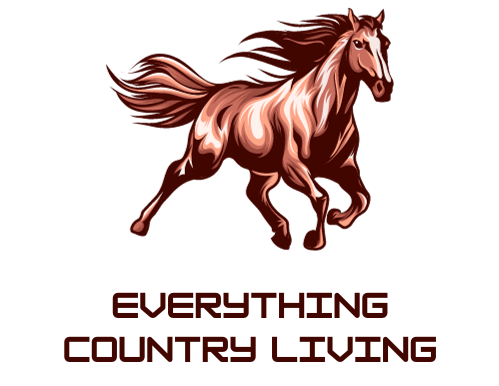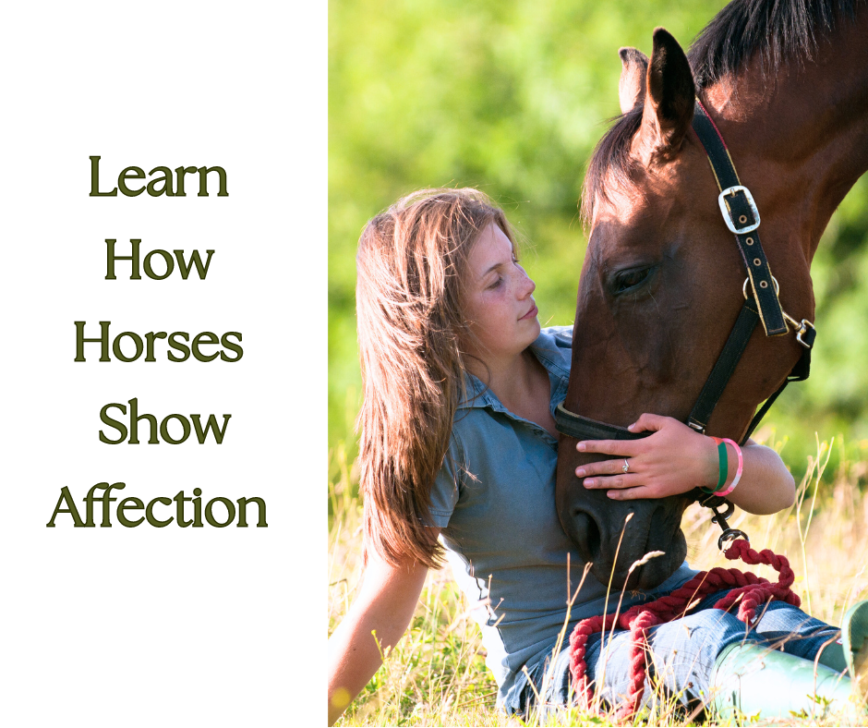
This post answers the question how horses show affection to humans and teaches you ways to bond with your horse.
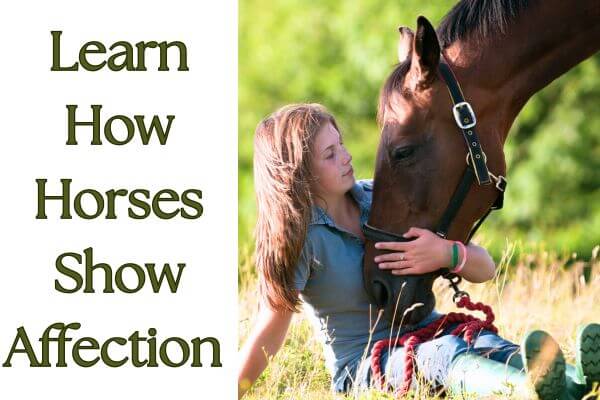
Horses, with their majestic presence and strong bonds with humans, have some truly unique ways of showing affection. As social animals, they thrive on interaction and connection, whether with their herd mates or their human friends.
For horse lovers and owners, understanding these loving gestures can deepen the bond with their equine companions and create a harmonious relationship. Let’s explore the many ways horses express their love and trust towards humans, making every moment spent together even more special.
Calling to You
Horses that are fond of you will often start nickering or neighing when they catch sight of you. This vocalization is a clear expression of excitement and joy, signaling that they consider you a friend and enjoy your company. When your horse calls out to you, it’s a heartwarming sign that they are happy to see you and eager to spend time with you.
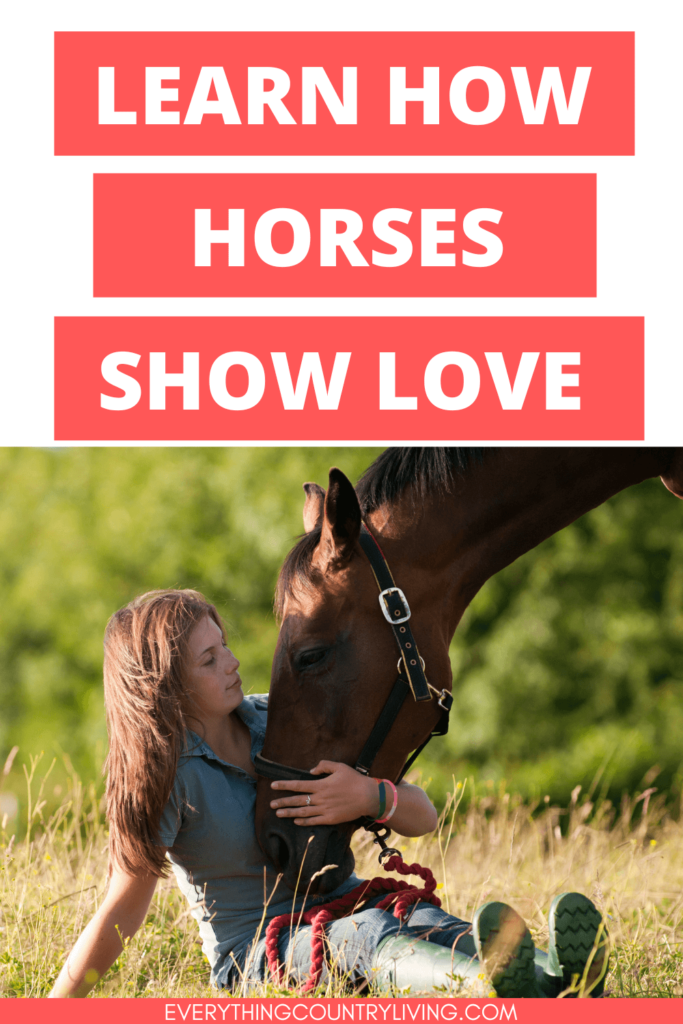
Approaching You
When a horse approaches you without being prompted, it’s a strong indication of affection. If she comes over when she sees or hears you, and it’s not because she’s expecting food or a treat, that’s a special form of affection. And if she even stops eating to come over to you, congratulations! You’re now as important to her as food, which is a big deal for a horse.
Remember, your horse picks up on your emotions. If you’re often around her when you’re stressed and in a hurry, you might unintentionally show frustration. Over time, she may start to associate you with those negative emotions. So, try to spend relaxed and happy moments with her to reinforce those positive feelings.
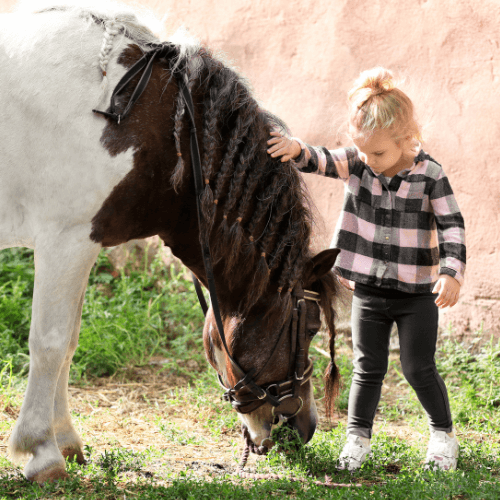
Mutual Grooming and Physical Contact
One of the sweetest ways horses show affection is through mutual grooming. In the wild, this behavior is like a special horsey handshake, a sign of trust and a way to strengthen their social bonds. When your horse nuzzles you or gently nips at your skin, it’s their way of saying, “Hey, I like you!” This affectionate act is an invitation to connect, and you can reciprocate by gently scratching their favorite spots, like their withers or neck. It’s a wonderful way to build a closer bond with your horse, showing them that you care just as much as they do.
Signs of Affection and Trust
Horses are prey animals, so they naturally guard their most vulnerable areas. When your horse lets you touch its head, back, or belly, it’s a huge sign of trust and affection. Think of it as your horse saying, “I feel safe with you.” Equine behaviorists note that this trust is a positive sign of the bond between you and your horse. It’s like your horse is giving you a big, silent hug!
Leaning is another thing your horse may do as a sign of affection. Since they’re little foals, horses will lean on other horses for companionship, comfort and safety. This behavior is often seen as a way for your horse to show trust and emotional connection, and it can also be an expression of comfort and relaxation.
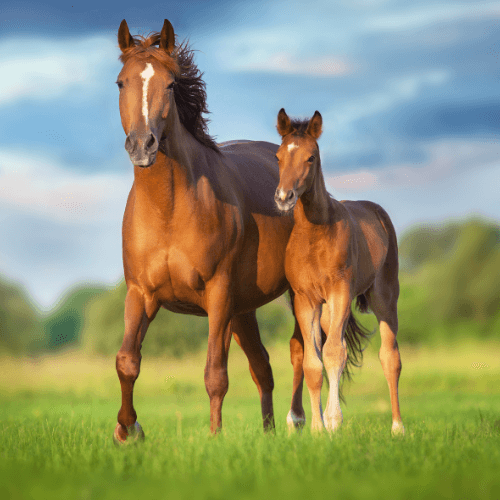
Blowing Air into Your Face
One surprising way horses show affection is by gently blowing air through their nostrils into your face. This gesture signifies great trust, love, and camaraderie. In the wild, horses blow into each other’s faces as a way to greet and bond with their herd members. When your horse does this to you, it’s her way of saying she considers you part of her inner circle. This close, gentle breath exchange is an intimate and affectionate act, demonstrating her comfort and connection with you. It’s a beautiful reminder of the strong bond you share, rooted in mutual trust and respect.
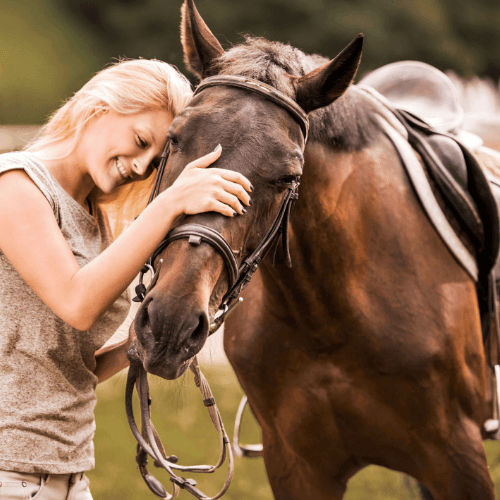
If a horse wants to be your friend, they gently blow at you. Then you should gently blow into their nostrils back. Supposedly, the Nez Perce (Niimipu) Tribe (and probably many other Native American tribes), used this technique with their Appaloosas long ago
Understanding Horse Body Language
Reading your horse’s body language is key to recognizing their signs of affection. Positive signs include a relaxed posture, soft eyes, and a lowered head. If your horse’s ears are swiveling to keep track of you and she’s turning her head to look at you, even if you aren’t giving her direct attention, she’s paying attention to you. This is a wonderful thing!
Licking and Chewing: A Sign of Relaxation
While licking and chewing aren’t directly signs of affection, they’re clear indicators that your horse is relaxed and content. You can encourage your horse to relax around you by helping her lower her head. A stressed or anxious horse often carries their head high, which increases tension throughout their back. By gently encouraging her to lower her head, you’re helping her release that tension and feel more at ease. When you see your horse licking and chewing, you know she’s in a happy, relaxed state, making your time together even more enjoyable.
Laying Down and Sleeping on Her Side
When your horse lays down and sleeps on her side in your presence, it’s the ultimate sign of trust. Horses only lie down to sleep and get the REM sleep they need when they feel completely safe. While lying down, your horse is incredibly vulnerable, relying on her instincts to stay alert to potential dangers. The fact that she chooses to lie down and trust you to watch over her and the surrounding area is a clear sign that she sees you as part of her herd. This special gesture shows that she feels secure and protected with you by her side.
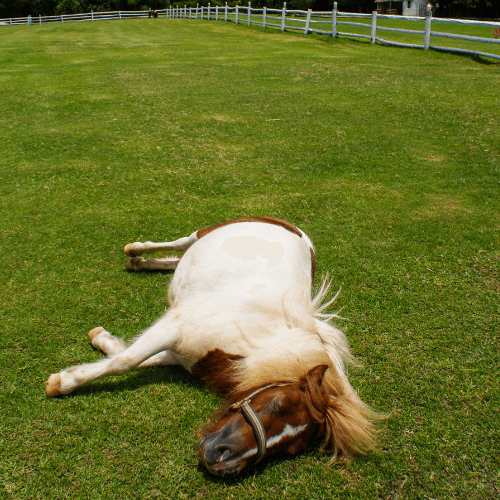
The Importance of Positive Reinforcement
Building a strong relationship with your horse is all about positive reinforcement. Rewarding good behavior with treats, praise, or gentle strokes helps create a positive experience for your horse, reinforcing their affection and trust in you. This approach is especially effective with young horses or those who might have had negative experiences in the past. It’s like giving your horse a big high-five for doing well!
Creating a Safe Haven
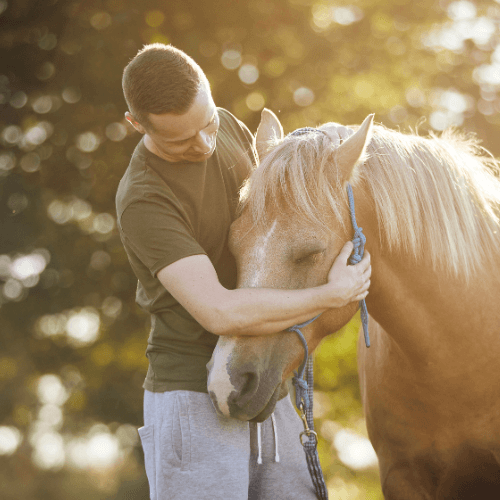
Horses seek comfort and protection from their herd, and you can become a part of that trusted circle by providing a safe and nurturing environment. Consistent and gentle interaction helps you become a reliable member of their “herd,” building mutual respect and affection. Your horse will start to see you as a source of comfort and security.
Social Interaction and Bonding
Horses are incredibly social animals that thrive on interaction. Spending quality time with your horse—whether through grooming, riding, or just being present—strengthens your bond. This interaction mirrors the social structure of wild horses, where time spent together fortifies relationships. The more you engage with your horse, the stronger your connection will become.
Recognizing Unique Ways of Affection
Every horse has its unique way of showing affection. Some may love physical contact, while others might express their fondness through subtle gestures like following you around, resting their head on your shoulder, or even mimicking your actions. Recognizing and appreciating these unique behaviors can deepen your special bond with your horse. It’s like learning their love language!
The Role of Heart Rate and Emotions
Studies have shown that a horse’s heart rate can indicate their emotional state. Positive interactions with humans can lower their heart rate, signifying relaxation and contentment. Conversely, a higher heart rate might indicate stress or nervousness. Understanding these physiological responses can help you create a positive and affectionate relationship with your horse, making them feel calm and happy around you.
The Impact of Facial Expressions and Vocalizations
Horses, much like humans, express their emotions through facial expressions and vocalizations. A relaxed facial expression, with ears turned towards you, shows a positive attitude and affection. Soft nickers and whinnies directed at you are also great signs of a strong bond and a happy environment. Your horse is basically smiling at you!
Building Strong Relationships Through Consistent Interaction
Consistency is the key to building a strong relationship with your horse. Regular interaction, positive reinforcement, and understanding their body language and emotional cues all contribute to a closer bond. Over time, these efforts result in mutual respect and affection that is deeply rewarding for both you and your horse. It’s like building a lifelong friendship.
Conclusion to How Horses Show Affection to Humans
In the horse world, understanding and recognizing the signs of affection from your equine companion can lead to a fulfilling and harmonious relationship. Whether you’re a new horse owner or have had your horse for years, these insights into equine affection can help you build a stronger, more loving bond with your four-legged friend.
Next time you’re with your horse, pay attention to these signs and gestures of affection. You’ll learn a great deal about your equine friend and strengthen the special bond you share. Remember, every affectionate gesture from your horse is a testament to the mutual trust and love between you, creating a lasting and meaningful connection.
This site contains affiliate links. I may earn a small commission, at no extra cost to you.
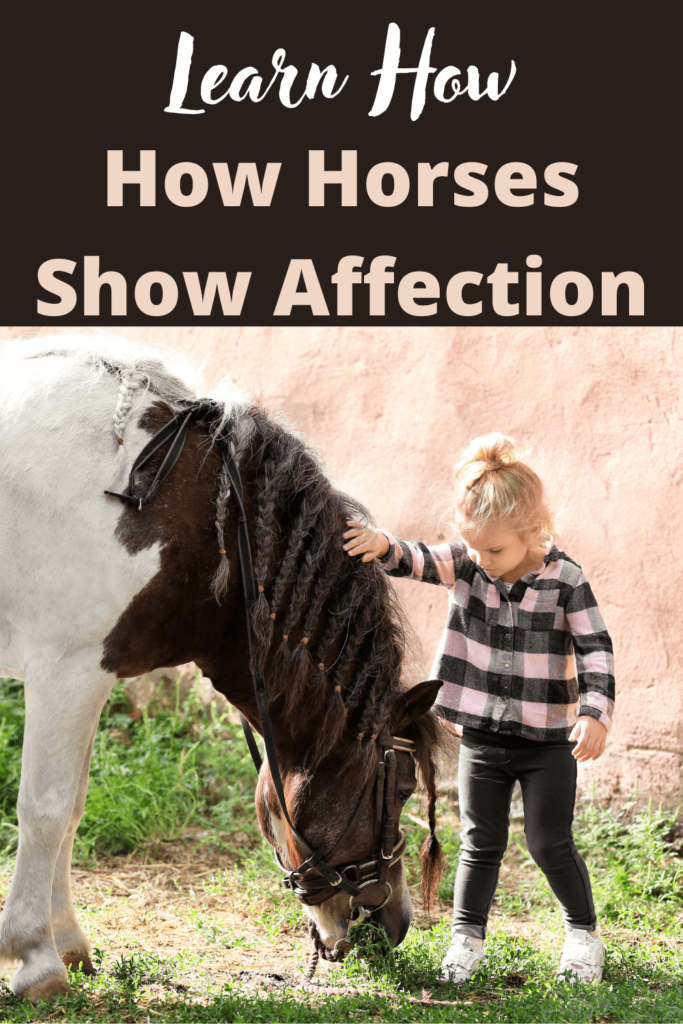
This post answered the question how do horses show affection to humans
Other Related Posts:
First Time Horse Owner – Ultimate Guide to Buying a Horse
The Best Horses for Beginners and New Horse Owners
How to Groom a Horse a Step-by-Step Guide
People describe their experiences of their horse showing them affection on Reddit
